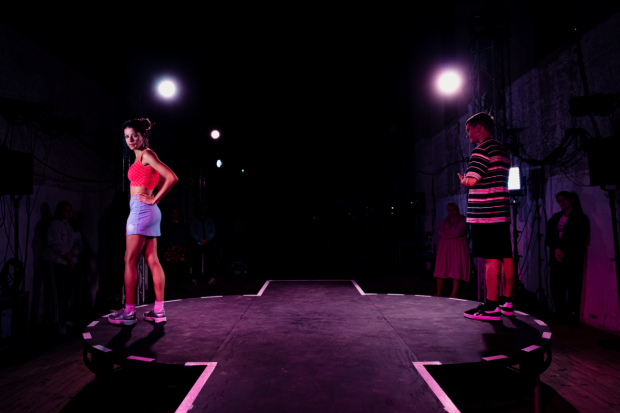Addictive Beat at Dilston Gallery – review

© Harry Elletson
Dancing in its purest form, letting loose and euphorically losing yourself in the music, is a unique sensation, a release, an escape where sound, rhythm and vibration bypass reason and language to appeal straight to the emotional and pleasure centres. Defying logic and reason, it can be difficult to articulate how that sense of joyous abandon feels. In many ways, that’s the antithesis of scripted plays where verbal communication is key to storytelling and unlocking the text. Kudos then to writer Dawn King and musical collaborators DJ Anikdote and Dom Coyote for attempting to synthesise the two in this unconventional piece for Boundless Theatre.
The “addictive beat” of the title refers to a track created by childhood friends Alex (or DJ ALX as he’s known on the club circuit) and singer Robbi, that has a hypnotic, entrancing power over everyone who hears it, like a latter day Red Shoes. The creatives are probably wise to leave this piece of music, bar a few tantalising scraps and samples, up to the audience’s imagination, not so much to avert terpsichorean carnage on the streets of Southwark but more because everyone will have their own idea of what an all-powerful, mind-altering, will-bending dance track might sound like. There’s stIll a lot of music here though: while not a musical, Addictive Beat is punctuated by extended dance sections, a couple of covers and a terrific original final song (“Alive”) that sounds like a bona fide floor-filler; Boadicea Ricketts’s Robbi has a cracking, rangy voice, and this banger really allows her to let rip.
If the music and Ira Mandela Siobhan’s dynamic, dramatic movement direction fare better than King’s script, that’s partly because Rob Drummer’s bare bones production plays out in a disused church (now a starkly stunning art gallery) where the acoustics afforded by the high vaulted ceiling and naked stone walls frequently render the dialogue unintelligible, especially when filtered through fairly rudimentary mic-ing. On the upside, the venue lends a grungy authenticity in that it looks exactly like somewhere that a rave might take place. Jess Bernberg’s sometimes blinding lighting is similarly basic but effective.
King’s script is a bit disappointing, especially when compared with some of her earlier work. She has demonstrated an intriguing talent for creating pieces that seem to be set in universes that look, on the surface, like our own but then turn out to be subtly, disturbingly different. If that’s not quite the case here, there are overtones of sci-fi and the dark fantasies of Philip Ridley in the descriptions of a dance beat so persuasive that it compels people to abandon all propriety and responsibility. The problem is that such a primal, mysterious force defies verbiage, leaving the characters grappling for different variations on words like “amazing” and “extraordinary” in order to get across what they’re experiencing, and it gets a little repetitive. Is it a metaphor for mental health struggles? Or drug addiction? Or both? It’s frustratingly unclear, and the cautiously upbeat ending feels rushed and doesn’t illuminate what has gone before.
For something that strives so hard to be cool and current, Addictive Beat feels oddly dated, like a throwback to the rave culture of the 1990s, although the combination of ambition and disaffection in Alex and Robbi is likely to chime with many young people who see this. Where the text seeks to be sinister – for example, Robbi describing how the music makes her younger sister dance til she literally drops – it can verge on the risible, while the intentional humour doesn’t always land, especially given those acoustics.
Both actors are excellent, overcoming some stilted early scenes to achieve real emotional heft as Alex and Robbi come apart at the seams right in front of us, physically and spiritually. Fionn Whitehead convincingly charts Alex’s journey from awkward stoner misfit to empowered god of the decks, elevated and emboldened by his music, then back to exhausted shell. He’s superb, and Ricketts is every bit his match, striking a telling but credible contrast between the raw ambition of a fledgling performer and her more fragile offstage persona. Their collective energy is quite something to behold.
If Addictive Beat doesn’t quite work either as a play or as immersive theatre, the unconventional setting, the insistence of the music and the commitment of the performances lend it a haunting quality that proves surprisingly hard to shake off. If you’re like me, it may even make you want to go out clubbing. A word to the wise though, if you’re planning to come, wrap up warm as the venue isn’t heated: no wonder those actors seldom stop moving.










